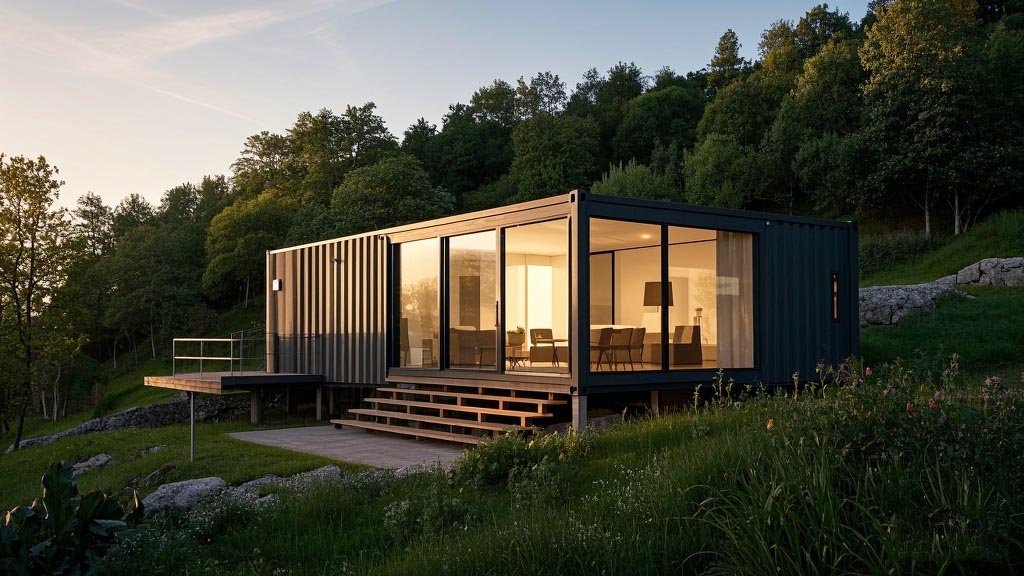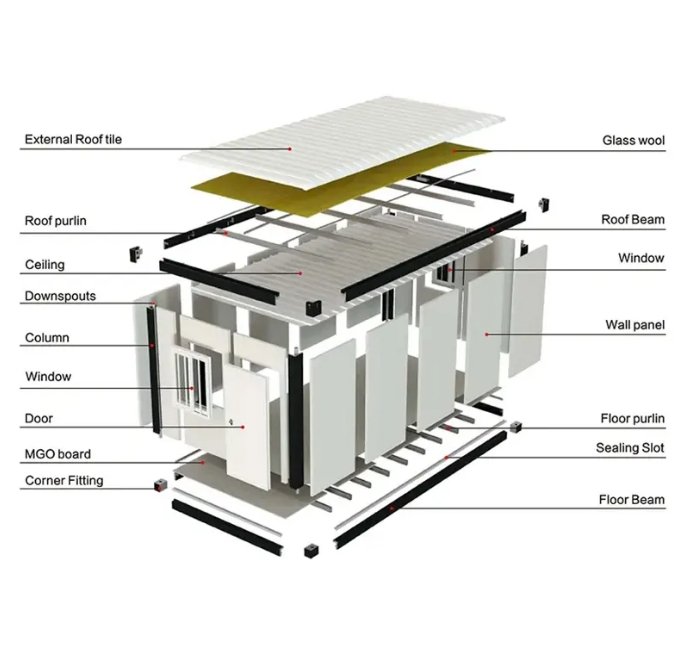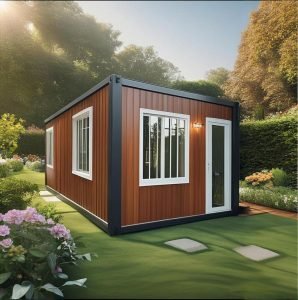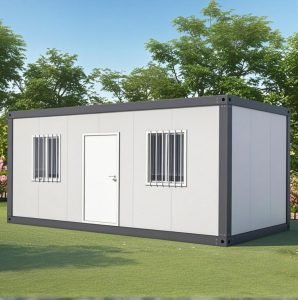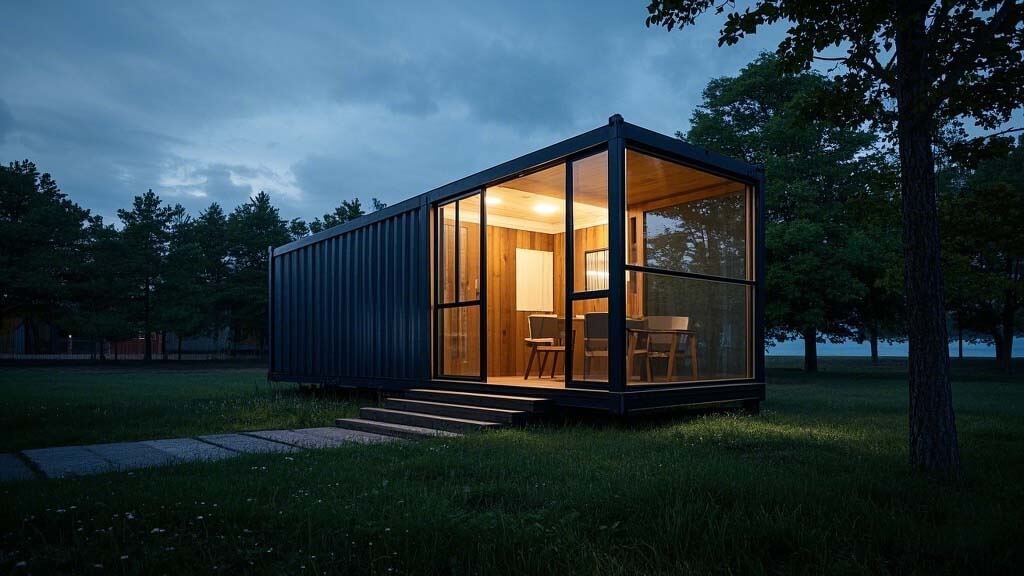In an era where sustainable and innovative housing solutions are in high demand, container houses have emerged as a remarkable alternative. These unique structures, crafted from shipping containers, offer a blend of practicality, affordability, and environmental consciousness. In this article, we’ll delve deep into the world of container houses, exploring their origins, construction, advantages, and diverse applications.
The Genesis of Container Houses
Container houses trace their roots back to the mid-20th century when the shipping industry experienced exponential growth. With an abundance of discarded or surplus shipping containers, creative minds began to see their potential as building materials. The first container houses were simple conversions, primarily used for temporary shelters or storage. However, as architectural technology advanced, container houses evolved from basic structures to sophisticated, habitable homes.
Understanding the Structure
Shipping containers are typically made of corten steel, a weather-resistant alloy known for its durability. This material forms the sturdy framework of container houses. Standard containers come in two main sizes: 20-foot and 40-foot units. These modular units can be stacked, joined, or modified in various ways to create a wide range of floor plans.
Modifications and Customizations
One of the key features of container houses is the ease with which they can be customized. Windows and doors can be cut into the steel walls, and additional insulation can be added to improve energy efficiency. Interiors can be finished with a variety of materials, from drywall to reclaimed wood, creating a warm and inviting living space. Some container houses even feature multi-story designs, achieved through stacking multiple containers.
The Advantages of Container Houses
Cost-Efficiency
Container houses are often more cost-effective than traditional construction methods. The use of pre-fabricated containers reduces labor costs and construction time. Additionally, the availability of used containers at a relatively low cost makes container housing an attractive option for budget-conscious individuals.
Sustainability
Container houses are an environmentally friendly housing solution. By repurposing shipping containers, we reduce the demand for new building materials and minimize waste. Moreover, many container houses are designed to be energy-efficient, with features such as solar panels and proper insulation, further reducing their carbon footprint.
Mobility and Flexibility
Container houses are highly mobile. They can be easily transported to different locations, making them suitable for temporary housing, vacation homes, or even disaster-relief shelters. Their modular design also allows for easy expansion or modification, adapting to changing needs over time.
Applications of Container Houses
Residential Living
Container houses are increasingly being used as permanent residences. They offer a unique and modern living experience, with many homeowners opting for open – plan designs, high – end finishes, and state – of – the – art amenities. Container houses can be customized to fit any lifestyle, from minimalist studios to spacious family homes.
Commercial and Industrial Use
Container houses are also finding applications in the commercial and industrial sectors. They are used as offices, retail stores, restaurants, and even art galleries. Their modular design makes it easy to create multi-unit complexes, providing a cost-effective solution for businesses.
Educational and Community Buildings
In the educational and community sectors, container houses are being used to create classrooms, community centers, and libraries. Their quick construction time and flexibility make them ideal for meeting the immediate needs of these institutions.
Healthcare Facilities
Container houses can be transformed into fully equipped healthcare clinics. Their easy assembly and mobility make them well-suited for providing medical services in remote areas or during emergency situations. For example, a container-based medical unit can serve as a primary care center in a rural village or as a triage center during a natural disaster.
Recreational Spaces
They make excellent spaces for recreational activities. Ski lodges near mountain resorts, beachside changing rooms, or even mobile fitness studios can be constructed using shipping containers. Their durability against harsh weather conditions ensures long-term usability, regardless of the location.
Emergency Relief Shelters
Container houses offer a rapid and reliable solution for providing shelter during crises. After a hurricane, earthquake, or flood, pre-fabricated container shelters can be quickly transported to the affected area. They can be set up in a short time, providing immediate housing for displaced families.
Agricultural Buildings
In the agricultural industry, container houses are used for various purposes. They can serve as storage units for farming equipment or be converted into greenhouses. Some farmers even use them as mobile farmhouses, allowing them to move closer to their crops during the growing season.
Tourism Accommodation
Unique container-based hotels and glamping sites are popping up around the world. These accommodations provide tourists with a one – of – a – kind experience, often with stunning views and modern amenities. For instance, container hotels located in the mountains or near the ocean attract travelers seeking an adventurous and sustainable stay.
The Future of Container Houses
As technology continues to advance, the future of container houses looks promising. New materials and construction techniques are being developed to improve the performance and aesthetics of container houses. For example, advancements in insulation materials are making container houses more energy-efficient, while 3D printing technology may soon be used to create custom-designed container components.
In conclusion, container houses represent a revolutionary approach to housing. They offer a sustainable, cost-effective, and flexible solution that meets the diverse needs of individuals, businesses, and communities. Whether you’re looking for a unique home, a commercial space, or a disaster-relief shelter, container houses have the potential to transform your vision into reality.

